
Software Impacts
Scope & Guideline
Advancing Software Science for a Brighter Future
Introduction
Aims and Scopes
- Software Development Methodologies:
Research focusing on new methodologies and frameworks for software development, including agile practices, DevOps, and software engineering principles. - Applied Software Solutions:
Papers that present practical software applications in various fields such as healthcare, environmental monitoring, and transportation, showcasing how software can solve specific problems. - Machine Learning and AI Integration:
Exploration of machine learning and artificial intelligence techniques applied to software development, including predictive analytics, automation, and intelligent systems. - Cybersecurity and Data Protection:
Studies addressing the security aspects of software, including intrusion detection systems, secure coding practices, and compliance with data protection regulations. - Software Tools and Frameworks:
Development and evaluation of software tools, libraries, and frameworks that facilitate research and practical implementations in various domains. - Simulation and Modeling:
Research related to the creation of software for simulation and modeling of physical systems, processes, or phenomena, aiding in analysis and decision-making. - Data Science and Analytics:
Papers that focus on software solutions for data analysis, visualization, and processing, emphasizing the importance of data-driven decision-making.
Trending and Emerging
- Artificial Intelligence and Machine Learning:
There is a significant increase in publications focusing on AI and ML, particularly in developing intelligent software solutions that enhance decision-making and automate processes. - Blockchain Technology:
An emerging interest in blockchain applications is evident, particularly in areas such as secure data sharing, decentralized applications, and supply chain management. - Sustainability and Green Computing:
Research exploring the role of software in promoting sustainability, energy efficiency, and environmental protection is gaining prominence. - Remote Work and Collaboration Tools:
With the rise of remote work, there is a growing focus on software solutions that facilitate collaboration, communication, and project management in distributed teams. - Cybersecurity Innovations:
As cyber threats evolve, there is an increasing emphasis on innovative software solutions for cybersecurity, including threat detection and response. - Interdisciplinary Applications of Software:
Emerging trends show a rise in interdisciplinary research where software applications cross traditional boundaries, integrating insights from various fields to solve complex problems.
Declining or Waning
- Traditional Software Engineering Practices:
There has been a noticeable shift away from traditional software engineering methodologies, such as waterfall models, as newer, more iterative practices gain traction. - Single-Domain Applications:
Research focused solely on single-domain applications has decreased, with a growing preference for multidisciplinary approaches that integrate various fields. - Basic Programming Techniques:
Papers discussing fundamental programming techniques and languages are less common, as the journal leans towards more innovative and complex software solutions. - Hardware-Specific Software:
Research centered on software tied to specific hardware platforms is waning, likely due to the increasing popularity of cloud-based and platform-agnostic solutions. - Manual Data Processing:
The focus on manual or simplistic data processing techniques has diminished in favor of more automated and intelligent data handling solutions.
Similar Journals
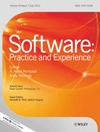
SOFTWARE-PRACTICE & EXPERIENCE
Fostering innovation in software practices for a dynamic future.SOFTWARE-PRACTICE & EXPERIENCE, published by Wiley, is a prestigious journal that has significantly contributed to the field of software engineering since its inception in 1971. With a Q2 ranking in Software according to the 2023 category quartiles, it stands among the top tier of journals, positioned in the 79th percentile within Scopus’s Computer Science _ Software category. The journal focuses on disseminating high-quality research that reflects both academic rigour and practical application in software-related practices, ensuring that it remains relevant for researchers, professionals, and students alike. Although it does not currently offer Open Access options, it continues to provide invaluable insights and thorough explorations of contemporary issues in software development, methodology, and experience. As it converges toward 2024, SOFTWARE-PRACTICE & EXPERIENCE aims to foster a greater understanding of effective software practices in a rapidly evolving technological landscape.
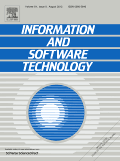
INFORMATION AND SOFTWARE TECHNOLOGY
Driving Breakthroughs in Software Engineering and Information ScienceINFORMATION AND SOFTWARE TECHNOLOGY, published by Elsevier, is a leading journal that stands at the forefront of the fields of software engineering, information systems, and computer science applications. Since its inception in 1970 and with a focus extending to 2025, this esteemed publication has made significant contributions to the discourse on technological advancements and innovations. In 2023, it has achieved a remarkable Q1 categorization across multiple domains, including Computer Science Applications, Information Systems, and Software, reflecting its excellence and relevance in the academic community. With Scopus rankings that place it in the top percentiles in its categories (85th, 83rd, and 83rd respectively), the journal serves as an essential platform for researchers, professionals, and students eager to disseminate and engage with cutting-edge research and developments. While it does not currently offer Open Access options, the knowledge curated within its pages remains invaluable for advancing the fields of information technology and software development.
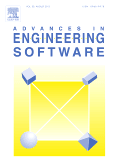
ADVANCES IN ENGINEERING SOFTWARE
Shaping Tomorrow's Engineering with Cutting-Edge Software Insights.ADVANCES IN ENGINEERING SOFTWARE, published by Elsevier Science Ltd, stands at the forefront of interdisciplinary research in the realms of engineering and software development. With an impressive impact factor reflected in its Q1 and Q2 rankings in the Engineering (Miscellaneous) and Software categories, respectively, this journal serves as an essential platform for researchers and practitioners alike to disseminate innovative findings and methodologies from 1982 to the present. Strategically positioned within the United Kingdom, it engages scholars, professionals, and students by publishing high-quality articles that emphasize advancements in software applications related to engineering challenges. Although it does not currently offer open access, the journal remains highly regarded within the academic community, consistently attracting impactful research and maintaining a commendable Scopus ranking within the top tiers of both general engineering and software disciplines. Explore the latest contributions to enhance your knowledge and stay updated on trailblazing developments in engineering software.
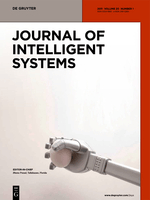
Journal of Intelligent Systems
Diving Deep into Intelligent Systems and SolutionsThe Journal of Intelligent Systems, published by DE GRUYTER POLAND SP Z O O, is a premier open access journal that has been at the forefront of advancements in the fields of Artificial Intelligence, Information Systems, and Software Engineering since its inception in 1991. With a commitment to disseminating high-quality research, the journal has been recognized in the 2023 category quartiles as Q3 in these critical areas, reflecting its relevance and impact in the academic community. The journal serves as a vital platform for researchers, professionals, and students interested in the evolving landscape of intelligent systems, offering insights into innovative methodologies and applications. As an open access publication since 2020, it ensures that research is readily available to a global audience, fostering collaboration and engagement within the scientific community. With a Scopus rank in the 65th to 69th percentiles across its categories, The Journal of Intelligent Systems continues to contribute significantly to the discourse on intelligent technologies and their implications for the future.
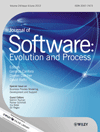
Journal of Software-Evolution and Process
Empowering Researchers with Open Access InsightsThe Journal of Software-Evolution and Process, published by WILEY, is a premier academic journal dedicated to advancing knowledge in the field of software evolution and methodologies. With an impact factor that places it in the Q2 quartile of software-related research, this journal is widely recognized for its rigorous peer-reviewed articles that explore the dynamics of software development, maintenance, and transformation. Addressing the challenges faced by software engineers and researchers, the journal seeks to provide innovative insights and solutions, fostering both theoretical understanding and practical applications. Since its inception in 2012, Journal of Software-Evolution and Process has contributed significantly to the academic community, featuring research that is highly relevant to contemporary trends and technologies in the software industry. For those committed to enhancing their expertise, this journal provides an invaluable resource via open access options.

PeerJ Computer Science
Advancing Open Access in Computer Science ResearchPeerJ Computer Science is a leading open access journal published by PEERJ INC, dedicated to the field of computer science. Since its inception in 2015, it has made significant strides in promoting scholarly communication and accessibility to cutting-edge research. With an impressive impact factor reflected by a Q1 ranking in the Computer Science (miscellaneous) category and a Scopus rank of 51 out of 232, this journal stands at the forefront of its field. The journal's open access model ensures that groundbreaking findings are readily available to researchers, professionals, and students alike, fostering collaboration and innovation in the ever-evolving landscape of computer science. As it continues to publish until 2024 and beyond, PeerJ Computer Science remains an essential resource for those seeking to stay ahead in their research and practice.

Computer Science and Information Systems
Fostering Collaboration Through Open Access InsightsComputer Science and Information Systems, an esteemed journal published by the COMSIS CONSORTIUM, serves as a vital platform for researchers and practitioners within the field of computer science and information systems. With an ISSN of 1820-0214, this open access journal has been disseminating high-quality research since 2004, making scholarly content readily accessible to a global audience. Based in Novi Sad, Serbia, the journal has established itself as a point of reference in the academic community, achieving a Q3 ranking in the Computer Science (miscellaneous) category as of 2023. With its coverage spanning from 2008 to 2024, it caters to a diverse range of topics, including software engineering, data processing, and system architecture. Although the HIndex is currently not available, the journal holds a respectable 43rd percentile ranking in the Scopus database for general computer science, showcasing its relevance in the field. By offering an open access model, it ensures that groundbreaking research can be freely accessed and utilized, fostering innovation and collaboration across disciplines.

Automated Software Engineering
Charting the Course for Automated Software SolutionsAutomated Software Engineering is a premier journal dedicated to advancing the field of software engineering through the exploration of innovative methodologies, tools, and applications. Published by Springer since its inception in 1994, this journal has established itself as a vital resource for researchers, industry professionals, and students alike, providing insights into the latest trends and technological advancements. With an impressive impact factor and currently ranked in the Q2 quartile of the Software category, it is recognized for its contribution to the discipline. The journal covers a broad scope of topics including automation in software development, empirical studies, and theoretical advancements, fostering discussions that bridge academia and industry. As we look forward to converging towards the year 2024, the journal continues to invite high-quality submissions that challenge existing paradigms and pave the way for future innovations in software engineering.

Jordanian Journal of Computers and Information Technology
Exploring Frontiers of Knowledge in Computer ScienceJordanian Journal of Computers and Information Technology, published by Princess Sumaya University and SRSF, stands as a significant platform for scholarly research in the realm of computer science, particularly in topics related to emerging technologies and information systems. With its Open Access model initiated in 2015, the journal facilitates global access to high-quality research findings, embodying the principles of knowledge sharing and academic collaboration. The journal's ranking in the Q3 category of Computer Science (miscellaneous) and its placement in the 54th percentile of Scopus' General Computer Science rankings underscore its growing reputation among researchers and professionals alike. Situated in Amman, Jordan, the journal actively contributes to the regional and international discourse on computing methodologies, applications, and innovations, making it an indispensable resource for scholars seeking to advance their understanding and engage with contemporary issues in technology.
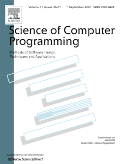
SCIENCE OF COMPUTER PROGRAMMING
Elevating Knowledge in Computer Programming and BeyondScience of Computer Programming, published by Elsevier, is a leading journal dedicated to advancing knowledge in the fields of computer programming, computational theory, and software development. With a focus on interdisciplinary research that spans computational methodologies, information systems, and simulation modeling, this journal plays a vital role in disseminating innovative findings and fostering collaboration among experts in these dynamic areas. With a respectable impact factor and ranked in various Scopus Categories such as computational theory (Q3) and information systems (Q2), it provides a platform for high-quality scholarly articles that push the boundaries of programming science. Although currently not open access, the journal offers invaluable insights for researchers, professionals, and students alike, ensuring they are equipped with the latest advancements and methodologies to thrive in an ever-evolving technological landscape. The journal covers research from its convergence starting in 1981 and continues to welcome groundbreaking contributions as it looks forward to an exciting future through 2025 and beyond.